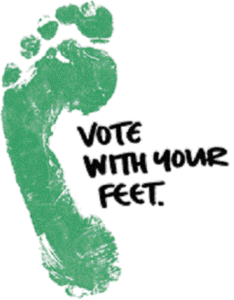The Volokh Conspiracy
Mostly law professors | Sometimes contrarian | Often libertarian | Always independent
My Very First Article on International Migration as a Tool for "Voting With Your Feet"
My 2008 article on this subject is now available on SSRN.

Back in 2008, I published my very first article on international migration as a mechanism for exercising political freedom by "voting with your feet." It was a short symposium piece, entitled "Tiebout Goes Global: International Migration as a Tool for Voting with Your Feet." I have now (admittedly belatedly) made it available for free download on SSRN. Here is the abstract:
Students of federalism have long recognized that citizens in a federal system can "vote with their feet" by moving from one jurisdiction to another. Those oppressed or harmed by the policies of one regional government can improve their lot by moving to another. Such "exit rights" are an important alternative to traditional "voice"-based political participation through voting. In a classic 1956 article, Charles Tiebout pointed out that foot voting can also help citizens find jurisdictions that more closely approximate their preferred mix of taxes and public services. However, scholars have so far failed to systematically consider the implications of foot voting and the Tiebout model for international migration. Although much research addresses the economic and human rights issues raised by movement across international boundaries, there has been very little discussion of its utility as a form of political participation through exit rights.
In this article, I make a tentative effort to plug this hole in the literature. I suggest that the benefits of international foot voting may well be much larger than those of free movement within national borders. Part II briefly summarizes the theory of foot voting and its potential benefits. In Part III, I show how these benefits are potentially much greater international migration than for domestic migration within advanced democracies.
Part IV considers some possible implications for migration law. Current international law requires nations to allow their citizens free exit, but does not require free entrance except in extremely limited circumstances. Unfortunately, the frequent denial of entry rights greatly undercuts the value of exit rights. To reap the full benefits of international foot voting, barriers to entry should be reduced. The considerations advanced in this paper do not provide a comprehensive theory of international migration rights. A full analysis would require a comprehensive balancing of the benefits of free migration against its costs. The advantages of foot voting do, however, provide an important consideration in favor of opening borders more than might otherwise be desirable.
This article was an early stage of my thinking on the subject. In part for that reason, I did not adequately consider several key nuances of the issue, and deliberately set to one side many types of potential objections to expanded migration rights. At the time, this foray into analyzing international migration seemed like it would just be a modest one-off addition to my work on foot voting, which otherwise focused almost exclusively on internal freedom of movement. Indeed, I only did the piece at all because I got an invitation to participate in an interesting symposium on the topic. I did not then fully appreciate the complexity of debates over international migration, or the heated emotions they often generate.
Fortunately, I have dealt with the issues that got short shrift in "Tiebout Goes Global" much more fully in later publications, particularly my forthcoming book Free to Move: Foot Voting, Migration, and Political Freedom (Oxford University Press), and my 2014 Nomos article "Foot Voting, Federalism, and Political Freedom," among other works. Despite its limitations, I hope my early effort might still prove useful to readers.


Show Comments (21)